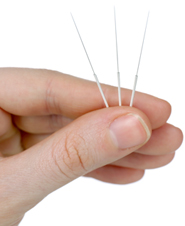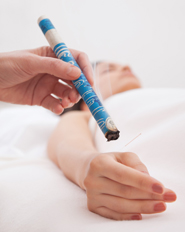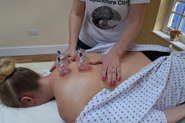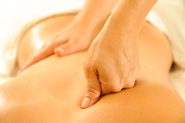Traditional acupuncture is a healthcare system based on ancient principles which go back nearly two thousand years. It is still used extensively in hospitals in China alongside western medicine.
 Traditional Chinese medicine explains acupuncture as a technique for balancing the flow of energy known as qi to flow through meridians in the body. This is done by inserting extremely thin needles into specific points along these meridians. The underlying principle of treatment is that illness and pain occur when the body’s Qi/natural energy cannot flow freely. There may be many reasons for this; emotional and physical stress, poor nutrition, infection and injury are the most common. The overall aim of acupuncture treatment is to restore the body and mind to a natural balance.
Traditional Chinese medicine explains acupuncture as a technique for balancing the flow of energy known as qi to flow through meridians in the body. This is done by inserting extremely thin needles into specific points along these meridians. The underlying principle of treatment is that illness and pain occur when the body’s Qi/natural energy cannot flow freely. There may be many reasons for this; emotional and physical stress, poor nutrition, infection and injury are the most common. The overall aim of acupuncture treatment is to restore the body and mind to a natural balance.
Western practitioners view the acupuncture points as places to stimulate nerves, muscles and connective tissue. Some believe that this stimulation boosts your body's natural painkillers and increases blood flow. From a Western medical perspective we know that acupuncture releases endorphins which are nature's pain relieving messengers. Acupuncture has become particularly well known for pain relief and in the field of fertility and IVF. There is a growing body of evidence to support the anecdotal claims associated with this treatment. The British Acupuncture Council compiles and provides all the latest research and evidence-based facts on acupuncture (www.acupuncture.org.uk).
 The actual treatment often carried out by means of very fine, single-use sterile needles which will stimulate specific acupuncture points. An acupuncture point is a little swirl (pool) of energy and it locates on the energy meridians. They range across the whole body, just like Vascular system, which is made up of vessels that carry blood and lymph throughout the body (photo of the man with veins and arteries).
The actual treatment often carried out by means of very fine, single-use sterile needles which will stimulate specific acupuncture points. An acupuncture point is a little swirl (pool) of energy and it locates on the energy meridians. They range across the whole body, just like Vascular system, which is made up of vessels that carry blood and lymph throughout the body (photo of the man with veins and arteries).
For the most people the sensation of needle insertion is minimal. In Chinese medicine the aim is to obtain what is called “deqi”, this is sensation of tingling or slight pulling. Deqi sensation will signal to me that the acupuncture point is reached and treatment has started.
 This is one of the most important parts of Acupuncture treatments. Moxa is a soft wooly substance prepared from mugwort leaves (Artemisia vulgaris). In practice it is placed directly on the skin or held just above the skin, over acupuncture point or meridian. It is very pleasant and warming treatment. Theraputic heat warms the area and affect the flow of Qi.
This is one of the most important parts of Acupuncture treatments. Moxa is a soft wooly substance prepared from mugwort leaves (Artemisia vulgaris). In practice it is placed directly on the skin or held just above the skin, over acupuncture point or meridian. It is very pleasant and warming treatment. Theraputic heat warms the area and affect the flow of Qi.
 This therapy involves local application of suction cups, it makes a strong effect on blood and Qi circulation, strengthens the metabolism and allows for faster elimination of substances that cause pain and cramping. It is often used for patients with musculoskeletal problems, those who suffer with colds and promote relaxation and well-being.
This therapy involves local application of suction cups, it makes a strong effect on blood and Qi circulation, strengthens the metabolism and allows for faster elimination of substances that cause pain and cramping. It is often used for patients with musculoskeletal problems, those who suffer with colds and promote relaxation and well-being.
 Historically used across Asia both in clinics and in the home and now we are using it in the West.
Historically used across Asia both in clinics and in the home and now we are using it in the West.
This is a treatment when scraping tool, usually made of jade, is used and light bruising/petechial appears as a result of the treatment.
As well as cupping, Gua sha has immune and anti-inflammatory effect.
Both Cupping and Gua sha can sometimes temporarily mark the skin. Such bruising is painless and generally clears within few days.
 It is a form of a medical massage. The practitioner manipulates the muscle and joints in order to restore free flow of Qi. Tui na is also a good diagnostic tool as it helps the practitioner to identify problematic areas via palpation. This massage is usually performed over the light layer of the clothing or cotton sheet.
It is a form of a medical massage. The practitioner manipulates the muscle and joints in order to restore free flow of Qi. Tui na is also a good diagnostic tool as it helps the practitioner to identify problematic areas via palpation. This massage is usually performed over the light layer of the clothing or cotton sheet.
Acupuncture is very relaxing treatment. Some people may feel a little tired, hence, it is advisable to take this into account when planning the treatment and activity after.
The British Acupuncture Council (BAcC) has a membership of around 3,000 professionally qualified acupuncturists. It is the UK's largest professional/ self-regulatory body for the practice of traditional acupuncture. Their website contains factsheets for over 60 conditions (www.acupuncture.org.uk) and provide summaries of research and how acupuncture may be beneficial. You should always consult your GP if you have any concerns or talk to a BAcC registered acupuncturist.
Please feel free to call us if you have any questions.
Tel: 07756 557 669
Email: [email protected]
Healthy Roots in Aylesbury, Buckinghamshire
Monday 10am - 6pm
Tuesday CLOSED
Wednesday 10am - 6pm
Thursday 10am - 6pm
Friday 10am - 3pm
Saturday CLOSED
Sunday 10am - 3pm